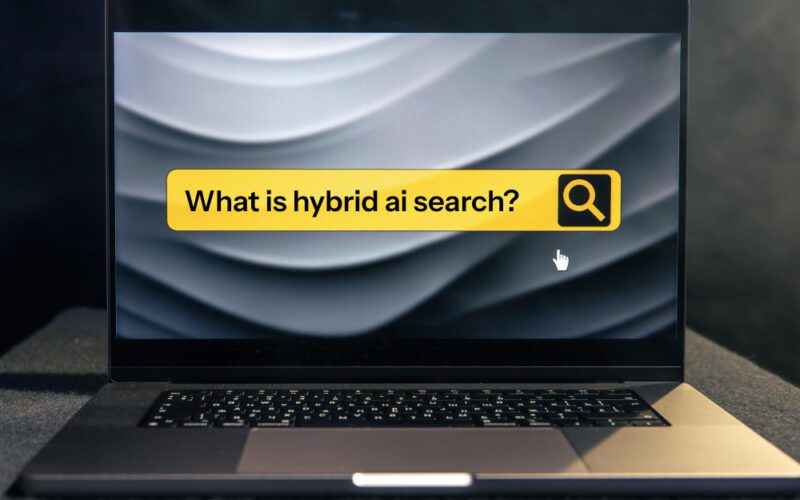What is Hybrid Search AI? Complete Guide to Next-Gen Search Technology (2025)
Hybrid search AI is revolutionizing how businesses find and retrieve information. Furthermore, this breakthrough technology combines three powerful search methods into one intelligent system. Additionally, it merges traditional keyword search, vector-based semantic search, and generative AI. As a result, businesses achieve unprecedented search accuracy and relevance.
The Future of Information Retrieval in Hybrid Search AI
Traditional search engines rely on exact keyword matches. However, they often miss the context and meaning behind your queries. In contrast, hybrid search in 2025 will become the go-to approach for enterprise applications. Moreover, it combines generative AI, vector search, and keyword-based methods.
Unlike conventional search tools, hybrid search AI understands what you’re really looking for. In other words, it goes beyond just the words you type. Subsequently, this intelligent approach processes your query through multiple search algorithms simultaneously. Therefore, it delivers results that are both precisely accurate and contextually relevant.
Three Technologies in One
The power of hybrid search lies in its three-layer approach. Specifically, it processes your search query through different intelligence systems:
Keyword Search Layer: This traditional method ensures you get exact matches for specific terms. Additionally, it handles names and technical phrases effectively. For example, when you search for “Windows 12 installation,” it finds documents containing those exact words.
Vector Search Layer: This AI-powered component understands the meaning behind your words. Furthermore, it recognizes context that traditional search misses. Consequently, it knows that “computer setup” and “PC configuration” are related concepts. Notably, this works even without shared keywords.
Generative AI Layer: The most advanced component synthesizes information from multiple sources. Moreover, it provides summarized insights within search results. As a result, users get answers to complex questions directly.
Real-World Applications That Saves
Legal Research Revolution: Legal researchers benefit from comprehensive search capabilities. Specifically, they retrieve exact matches for statutes through keyword search. Meanwhile, vector search finds related cases. Additionally, generative AI provides synthesized insights from multiple sources. Consequently, this reduces research time from hours to minutes. Furthermore, it ensures comprehensive coverage.
Enterprise Knowledge Management: Companies using hybrid search report impressive results. For instance, they achieve 60% faster information retrieval. Moreover, they see 40% improved decision-making speed. Additionally, employees can ask natural language questions. For example, they might ask “What were our Q3 marketing campaign results?” Subsequently, they get comprehensive answers from multiple data sources.
E-commerce Search Enhancement: Online retailers implementing hybrid search see significant improvements. Notably, they experience 35% higher conversion rates. Furthermore, customers find products through descriptive queries. For instance, they search for “lightweight laptop for college students under $800.” In contrast, traditional search requires exact product names.
Setting Up Hybrid Search AI: Step-by-Step Guide
Step 1: Choose Your Platform Major cloud providers offer hybrid search solutions. For example, Microsoft Azure AI Search provides enterprise-ready capabilities. Similarly, Google Cloud Vertex AI and AWS Kendra offer different pricing models. Therefore, evaluate each platform based on your specific needs.
Step 2: Prepare Your Data First, organize your content into searchable formats. Additionally, hybrid search works best with diverse data types. Specifically, this includes documents, databases, images, and structured data files. Moreover, proper data organization improves search accuracy significantly.
Step 3: Configure Search Parameters Next, balance the three search methods based on your requirements. For instance, technical documentation might emphasize keyword precision. In contrast, customer support could prioritize semantic understanding. Therefore, adjust settings accordingly.
Step 4: Train and Optimize Finally, monitor search analytics to understand user behavior patterns. Subsequently, adjust weighting between keyword, vector, and generative components. Furthermore, base these adjustments on performance metrics for optimal results.
Benefits That Transform Business Operations
Improved Search Accuracy: Users report finding relevant information 70% faster. Additionally, this compares favorably to traditional search methods. Furthermore, businesses see significantly reduced “search frustration.” As a result, fewer queries get abandoned.
Cost Reduction: Companies eliminate redundant information requests effectively. Moreover, they reduce support ticket volumes by 45%. This happens when employees can self-serve accurate information quickly. Consequently, operational costs decrease substantially.
Enhanced User Experience: Natural language queries mean users don’t need complex search syntax. Additionally, they don’t need to guess exact keywords. Instead, simply ask questions as you would speak them. Therefore, the user experience improves dramatically.
Implementation Costs and ROI Expectations
Hybrid search AI implementation typically costs between $5,000-$50,000 annually. However, this depends on data volume and complexity. Furthermore, businesses report ROI within 6-8 months. Specifically, this comes through productivity gains and reduced manual research time.
Small businesses can start with solutions like Algolia or Elasticsearch. Notably, these cost under $500 monthly. In contrast, enterprise implementations may require custom development. Therefore, integration costs vary significantly.
Future of Hybrid Search Technology
The hybrid search market is projected to grow 300% by 2026. Moreover, more businesses recognize its competitive advantages. Additionally, emerging features include multi-modal search capabilities. Specifically, this combines text, images, and voice queries. Furthermore, real-time personalization learns individual user preferences.
Integration with business intelligence tools will expand significantly. Similarly, automated workflow triggers will become standard. Consequently, hybrid search will become the central nervous system of digital workplaces. Therefore, it will route information and trigger actions based on search intent.
Hybrid search AI represents more than just better search results. Instead, it’s a fundamental shift toward intelligent information systems. Moreover, these systems understand human intent effectively. As a result, they deliver actionable insights instantly.









